The eVSM toolbar in Visio 2003 looks similiar to this.

If the toolbar is missing, then your eVSM session has not starter properly. In this event, please check ALL of the following.
1. Make sure the eVSM Toolbar is not switched off
To check, right-click on the Visio toolbars and display the following list. In this list, if you see "eVSM Toolbar", make sure it is checked.

2. Verify that your license is Current
To check your license status, click Start > Programs > eVSM Software > About eVSM.... This will open the following dialog box.
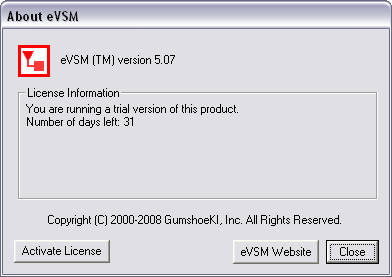
If you are running eVSM on Trial, and your trial period has expired, then the eVSM toolbar will not appear. In this event, you can purchase eVSM at www.evsm.com/products or request a trial extension period from support@evsm.com
If you have purchased eVSM, then click the Activate License button and enter your Product Key.
If the "About eVSM" dialog looks similar to the following, then your license is properly activated. In this case, go to step 3 below.
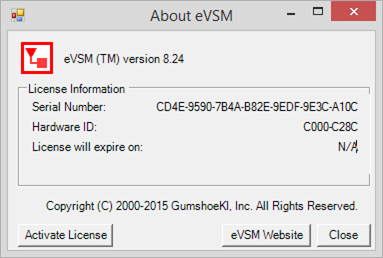
3. Make sure you do not have duplicate versions of eVSM installed
Open your Add/Remove Programs dialog (Start > Control Panel > Add/Remove Programs). Scroll down to where you see eVSM on the programs list. If you see more then one version of eVSM on this list, un-install all versions. Then install version 7 from: http://www.evsm.com/evsm-software-download-latest-version
4. Make sure Macros are Enabled
Macros must be allowed to run (ie. Enabled) to run eVSM. At eVSM start-up, you should be prompted to enable Macros, be sure to click the Enable button.
If you do not see the macros prompt at start-up, then in Visio 2003, set your macros security level to Medium. This is done by clicking Tools > Macros > Security... which will display the following dialog.
After selecting Medium, click OK, exit Visio, and restart eVSM.
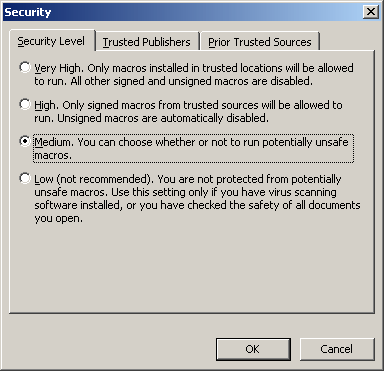
5. Make sure Visual Basic is Enabled and Available in Visio
Click Tools > Options > Security to display the following dialog. Ensure checkboxes are set as shown below. If you make any changes, you must exit Visio and restart eVSM.

Click Tools > Macros > Visual Basic Editor. This should open a window similar to the one shown below. If it does, then just close it and go on the next item. If you do not see the following window, then you will need to re-install Microsoft Visio.
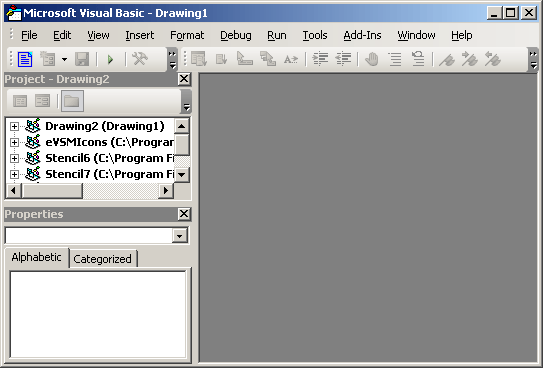
6. Make sure Visual Basic environment in Excel is available
Start Excel and click Tools > Macros > Visual Basic Editor. This should open a window similar to the one shown below. If it does, then just close it and go on the next item. If you do not see the following window, then you will need to re-install Microsoft Excel.
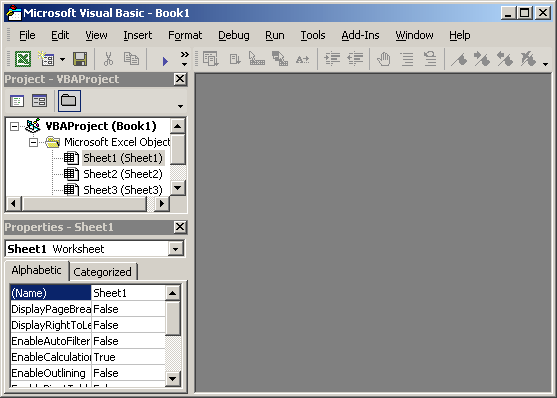
7. Try resetting the eVSM ribbon
To reset the eVSM ribbon, type Alt+F8 in Visio to open the Macros dialog, which will look similar to the image below:
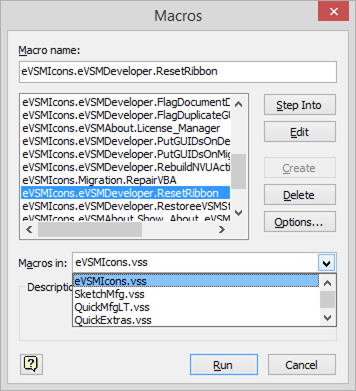
To run the code, first select eVSMIcons.vss from the "Macros in:" dropdown.
Then, select "eVSMIcons.eVSMDeveloper.ResetRibbon" and click Run.
8. If the above does Not resolve the problem...
Send the following screen captures to support@evsm.com
- Start eVSM and create screen captures of any messages that pop-up.
- In the Windows Start menus, click Start > Programs > eVSM Software > About eVSM... Capture the dialog box that is displayed.
- Open your Add/Remove Programs dialog (Start > Control Panel > Add/Remove Programs). Scroll down to where you see eVSM on the programs list and capture the dialog.